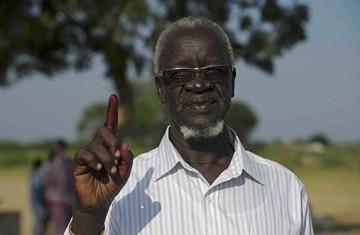Sudan sets new date for AUPSC visit to Abyei
October 28, 2013 (KHARTOUM) – Sudan’s foreign ministry and the African Union Peace and Security Council (AUPSC) have agreed on a new date for the visit of the AUPSC delegation to the contested border area of Abyei.

The Dinka Ngok started casting their vote in a unilateral and symbolic referendum organized by the community. The result which is expected to express their demand to secede from Sudan and join South Sudan would be announced on Thursday.
Sudan’s foreign minister Ali Karti said on Sunday that the visit has been postponed because the timing was not right due to the ongoing vote carried out by “some parties” in Abyei.
“As the Council rejected these unilateral actions, we did not want its visit coincides with these preparations,” Karti said.
The AUPSC issued a communiqué over the weekend accusing Khartoum of obstructing the visit the African body to Abyei scheduled on 26 and 27 October.
The statement of the 15-member body strongly reacted to the move of the Sudanese authorities and demanded that “Sudan must refrain from obstructing its work and extend full cooperation in support of the AU’s efforts to manage and resolve the situation in Abyei”.
On Monday, Karti pointed fingers at the Dinka Ngok saying they are attempting to ruin relations between Khartoum and Juba by insisting on holding the unilateral referendum.
He called the vote “illegitimate” and “worthless” that would not be recognized by either governments nor regional or international organizations.
“Let whoever wants to vote do so but what is the value of this referendum?” Karti added.
The foreign minister said no institutions in Abyei can be formed based on the unilateral referendum results stressing that this is a process that is to be conducted by north and south Sudan.
Last year, the AU mediation team proposed holding a referendum in Abyei this October in a bid to break the deadlock over the region which dragged on for more than two years.
However, Sudan rejected the proposal, saying it ignored that the eligibility of the Arab Misseriya tribes and that public administration and institutions of the referendum commission, legislative councils, civil and security institutions, and the administrative arrangements must be established first before any vote can take place.
In a related issue, Sudan’s foreign ministry undersecretary, Rahmatallah Mohamed Osman, told the pro-government Ashorooq TV on Sunday that out of all the cooperation agreements signed with South Sudan, only Abyei and external debts are handled by the African Union High Implementation Panel (AUHIP).
In September 2012, Sudan and South Sudan signed a series of cooperation agreements, which covered oil, citizenship rights, security issues, banking, border trade among others. In March of this year, the two countries signed a matrix containing implementation timelines for these accords.
Osman revealed that Sudan stipulated commitment from the international community to help it settle its debts, saying that there are positive signals in this regard.
“If the international community doesn’t help, we will share debts with South Sudan”, Osman said.
He said that there are several mechanisms available for resolving the debts issue in cooperation with the international community.
“We are satisfied with the positive developments in relations between the two countries [Sudan and South Sudan] to reach goals, solutions and results”, he added
He further stressed that South Sudan has realized the importance of its relations with Sudan, saying that ties between the two countries are in the right direction and backed by a true political will.
The Sudanese official revealed that he will visit Juba on Wednesday to follow up on the implementation of the cooperation agreements.
He said that international powers sometimes support good relations between Sudan and South Sudan to serve their own interests, pointing that both countries are trying to minimize external influences on their relations saying he does not rule out that some countries and bodies outside Africa are seeking to poison relations between Khartoum and Juba.
Osman went on to say that implementation of the security agreement is on the right track , adding that both sides agreed that border crossings wouldn’t be opened before determining the baseline for the demilitarized security zone (zero line).
“We asked the AU to send a committee to determine the zero line”, he said.
(ST)
